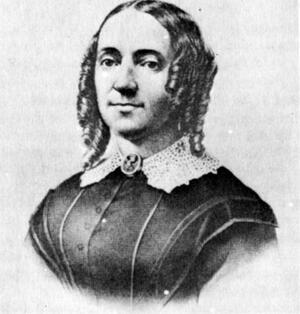Suffragist and anti-slavery activist Ernestine Rose addresses annual Thomas Paine dinner
Ernestine Rose (1810-1892) was a pro-suffrage, anti-slavery orator in the United States whose activism was recognized by contemporaries as a key contribution to the suffrage movement.
This photo is in the public domain.
For more than 20 years, Ernestine Rose, born in Poland in 1810, worked as a leading pro-suffrage, anti-slavery orator in the United States. Rose came to the US at age 26 to help found a community of free-thinkers, drawing upon the ideas of Robert Owen which emphasized individual liberty and economic cooperation. Having left Poland to escape an arranged marriage, Rose had encountered and adopted Owenite free-thought ideas in England, where she also met and married her husband. Once in the US, the Roses elected not to join a separatist Owenite colony, but instead became active in free-thought, abolitionist, and women's rights circles in New York City. Ernestine quickly devoted herself to the legislative effort to grant married women in New York State legal control over their own property.
By the 1840s, Rose was a regular speaker at the annual Thomas Paine dinner in New York, held to celebrate the birthday of the Revolutionary-era pamphleteer and freethinker on January 29. In an 1848 speech at that event, Rose combined anti-slavery and women's rights imagery with free-thought ideas. Borrowing language from abolitionist and women's rights activist Sarah Grimké, Rose told her audience that "superstition keeps women ignorant, dependent, and enslaved beings. Knowledge will make them free. The churches have been built upon their necks; and it is only by throwing them off, that they will be able to stand up in the full majesty of their being."
This mixture of causes was a hallmark of Rose's oratory, and her popularity on the stages of various movements helped to advance them all. But Rose's work was not limited to giving speeches. In the 1840s, she worked with Susan B. Anthony to pass a New York state law that would protect married women's property rights. In 1869, she joined Anthony and Elizabeth Cady Stanton to found the National Woman's Suffrage Association. Anthony called her the "most eloquent...speaker on our platform," and "that noble worker for the cause of women's rights." Though American women would not obtain the right to vote until more than a quarter-century after Rose's death in 1892, her activism was recognized by contemporaries as a key contribution to the suffrage movement.
Sources: Carol Kolmerten, The American Life of Ernestine L. Rose, (Syracuse, 1999); The Ernestine Rose Society, www.brandeis.edu/ centers/wsrc/ Ernestine_Rose_Website/ ERhomepage.html; Ernestine Rose (author), Paula Doress-Worters (editor), Mistress of Herself: Speeches and Letters of Ernestine Rose, Early Women's Rights Leader (The Feminist Press at CUNY, 2007).



